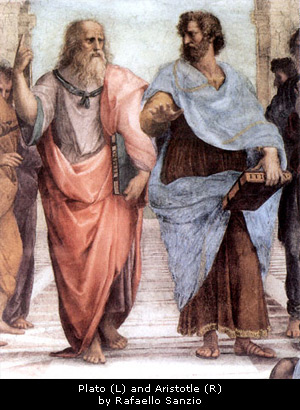ARISTOTLE
Father of Science
Aristotle was born in 384 B.C. in Stageira in Macedonia. His father, Nicomachus, was the court physician to the king of Macedonia. Aristotle probably received extensive training in biology and medicine from his father. These were his preferred fields, although Aristotle studied and wrote about all the sciences.
 As a youth, Aristotle distinguished himself as a student at Plato's Academy in Athens. He was even named to be Plato's successor, but declined the position due to doctrinal differences. Aristotle later commented that, although he loved Plato, he loved the truth more.
As a youth, Aristotle distinguished himself as a student at Plato's Academy in Athens. He was even named to be Plato's successor, but declined the position due to doctrinal differences. Aristotle later commented that, although he loved Plato, he loved the truth more.
In contrast to his teacher Plato, who considered the physical world of becoming to be an imperfect, ephemeral and illusory reflection of the spiritual world of being, Aristotle affirmed the essential reality of the physical world, and said that the senses must be trusted as the primary sources of valid knowledge. Aristotle's philosophy was empirical and experiential; he believed in approaching Nature with an open mind to learn Her secrets.
Experimentation and observation were the cornerstones of Aristotle's science. He affirmed the precedence of facts over theory by declaring that if newly discovered facts contradicted a previously held theory, the theory had to be modified or discarded to accommodate them. In Aristotle, we can see the origins of modern science and the scientific method.
Although he greatly loved medicine and probably even practiced it on occasion, Aristotle most distinguished himself in the field of biology. An avid natural historian who tirelessly studied and catalogued many species of plants and animals, Aristotle was the father of comparative anatomy and physiology, and of later theories of evolution and embryology.
Aristotle's personal philosophy and ethics center on the virtue of reason and the Golden Mean. Aristotle believed that the highest virtue that a man could have came from the proper exercise of his reason. He believed that all true happiness and morality came from adhering to the Golden Mean of moderation in all things.
Aristotle's most important contribution to the theory of Greek Medicine was his doctrine of the Four Basic Qualities: Hot, Cold, Wet, and Dry. Later philosopher-physicians would apply these qualities to characterize the Four Elements, Four Humors, and Four Temperaments. The Four Basic Qualities are the foundations for all notions of balance and homeostasis in Greek Medicine.
Aristotle later founded his own school of philosophy, the Lyceum, which was patterned after Plato's Academy. However, his teachings were to be spread far and wide through the conquests of his most illustrious pupil, Alexander the Great.
The early Church fathers vastly preferred the spiritual, otherworldly philosophy of Plato and the Neo-Platonists over Aristotle, who was esteemed chiefly as a logician. But in the High Middle Ages, Muslim philosopher-Physicians like Avicenna and Averroes brought a newfound appreciation for other aspects of Aristotle's science and philosophy.
And so, Aristotle's teachings on biology, medicine and the natural sciences were finally accepted by the Church and incorporated into the medieval worldview. But, as with Galen, much of his work was blindly accepted as dogma and never questioned until the Renaissance. Like Galen, Aristotle, although impressive, was not infallible.
Aristotle in a Nutshell
 Metaphysics: Change is both natural and necessary. Four different kinds of causes explain the process of change:
Metaphysics: Change is both natural and necessary. Four different kinds of causes explain the process of change:
Material Causes - due to what an object is made of.
Formal Causes - due to an object's design.
Efficient Causes - due to a thing's maker
Final Causes - involving the end towards which a thing is destined.
Epistemology: The most reliable source of knowledge is from the senses and direct experience and observation. Facts take precedence over theories.
Logic: Invented the syllogism: two basic premises leading to a third conclusion.
There are ten basic categories of statements that can be made about any given thing:
1) Its substance, or kind.
2) Its qualities, traits and attributes.
3) Its quantity.
4) Its relationship to other things.
5) Its placement, or location.
6) Its time, or age.
7) Its position.
8) Its state.
9) Its actions, or what it does.
10) Its receptions, or what is done to it.
Ethics: The virtue of reason: Man is a rational animal.
The Golden Mean: moderation in all things.
Medicine: The Four Basic Qualities: Hot, Cold, Wet and Dry.
Biology: Natural historian; comparative biology, anatomy and physiology.
Early theories of evolution and embryology.
Source: Spark Charts: Philosophy - www.sparkcharts.com
Acknowledgements:
Spark Charts: Philosophy Copyright 2002 by Spark Notes LLC, a Barnes & Noble Publication
A Dictionary of Philosophy by Dagobert D. Runes
Copyright 1960 by Littlefield, Adams and Co.
Entry on Aristotle
Internet Resources:
www.crystalinks.com/aristotle.html
















